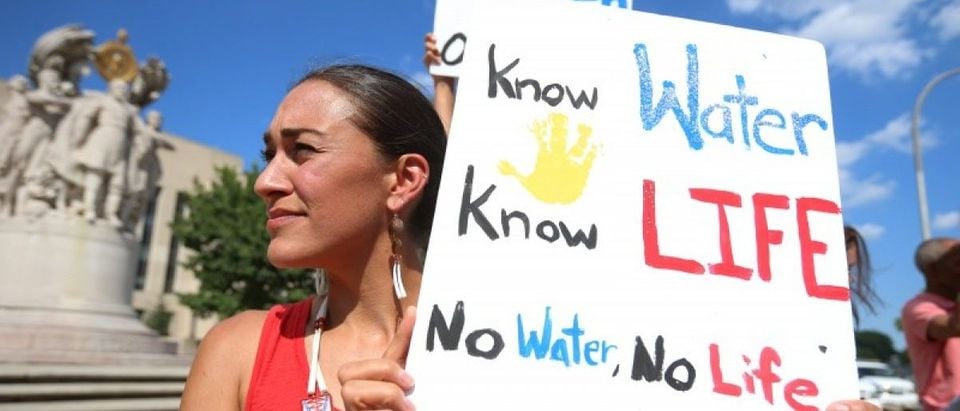Construction on a hotly contested North Dakota oil pipeline will be temporarily halted while a Washington, D.C., appeals court considers a Native American tribe’s legal claim that the project would destroy their tribal lands.
The DC Circuit of the U.S. Court of Appeals decided Friday that construction on the Dakota Access Pipeline will be temporarily stopped within 20 miles of Lake Oahe in North Dakota while the court considers whether to order a longer delay.
The 1,200-mile pipeline is a joint venture between energy companies Marathon Petroleum Corp. and Enbridge Energy Partners LP, and Energy Transfer Partners.
Many of the same environmentalist groups that opposed the Keystone XL pipeline have joined the fight against the Dakota Access Pipeline (DAP), which would bring 470,000 barrels of Bakken crude oil per day from western North Dakota to southern Illinois.
The nearly $4 billion project has come under incredible scrutiny as protesters and members of the Standing Rock Sioux argue the pipeline’s construction would trample on tribal lands and destroy artifacts. They also argue it could potentially poison waterways, including rivers such as the Missouri River and Lake Oahe.
Anti-pipeline protesters and tribes members rallied Aug. 25 outside of the U.S. District Court for the District of Columbia while others clamored inside the court to wage a legal battle over the $3.7 billion project.
The prolonged court battle culminated in the court denying the motion for a preliminary injunction to the predecessors of the Great Sioux Nation, arguing that the Native American tribe could not show how the pipeline would damage the group’s sacred ground.
Activists and tribes members fought with the oil pipeline developers over whether the National Historic Preservation Act (NHPA) could prevent construction of the pipeline. The NHPA, among other things, allows the government to preserve historical and archaeological sites.
The Obama administration announced Sept. 9 that construction on the nearly controversial pipeline would be shelved until the government can determine the effects it will have on the environment.
The Department of Justice and the Department of the Interior announced the pause in an area near the North Dakota’s Lake Oahe, a major water resource for the state’s Standing Rock Sioux Tribe.
Meanwhile, legal analysts continue to berate President Barack Obama’s decision.
Richard Epstein, a New York University law professor, called “the aggressive and unexplained actions” by the Justice Department, “unprecedented in the annals of American environmental litigation.”
Epstein, who has advised Energy Transfers Partners, suggested in a post on Forbes that the Standing Rock Sioux tribe had plenty of time to consult with the Army Corps of Engineers but refused – instead, the “Tribe boycotted the entire” consulting process, he wrote.
The Army Corps of Engineers attempted more than a dozen times between 2014 and 2016, according to court documents, to discuss the Dakota Access pipeline route with the Standing Rock Sioux Tribe. The tribe either failed to respond to requests for consultation or dragged its feet during the process, even after continued badgering from the Corps.
The energy industry appears to be taking the decision by the appeals court in stride.
The court’s earlier decision “confirmed that the Army Corps of Engineers did their jobs expertly and in accordance with the law,” Craig Stevens, a spokesman with Midwest Alliance for Infrastructure Now Coalition (or MAIN), told The Daily Caller News Foundation in a statement Friday.
He added: “We are confident that another fair review of the Corps’ work will render the same decision.”
Follow Chris on Facebook and Twitter
All content created by the Daily Caller News Foundation, an independent and nonpartisan newswire service, is available without charge to any legitimate news publisher that can provide a large audience. All republished articles must include our logo, our reporter’s byline and their DCNF affiliation. For any questions about our guidelines or partnering with us, please contact licensing@dailycallernewsfoundation.org.


